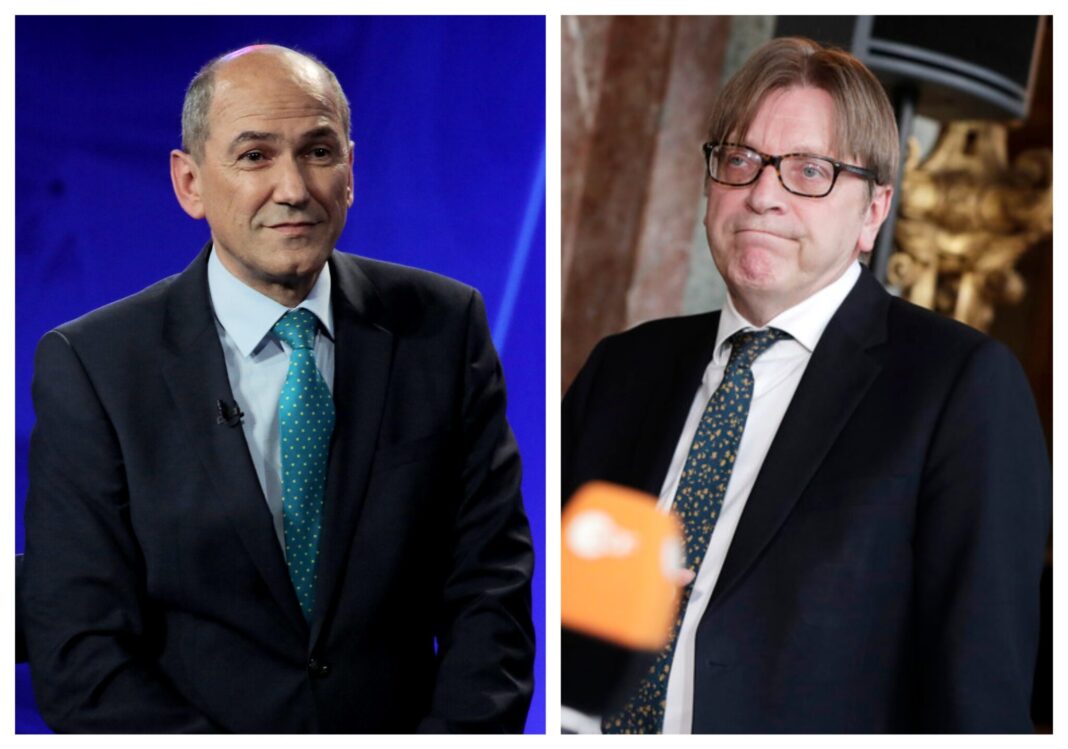By: Nina Žoher / Nova24TV
Guy Verhofstadt, a Belgian MEP from the Renew Europe, found himself among the actors who are suddenly insanely worried about the state of the media in Slovenia. Ever since the famous Politico article appeared, accusing Prime Minister Janez Janša of intimidating and persecuting media he does not like, concerns can be seen on the part of Verhofstadt. Despite the fact that the Prime Minister Janez Janša and many Slovenian intellectuals have repeatedly explained on the basis of a series of arguments that this is a record that is unbelievable, Verhofstadt still does not give in.
This time, Guy Verhofstadt criticised the record of Janez Janša, who in response to the flood of false news about the state of the media in Slovenia wrote the following: “If you repeat a lie often enough, it becomes (truth) journalism”. With this concrete note, Janša responded to the Kleine Zeitung, who this time launched a worn-out road joke, about “Marshal Twitter” referring to what hurts domestic leftists – that the current Prime Minister likes to bypass (their) central media and communicates his thoughts directly through social networks, thus avoiding manipulation, and making his voice more audible.
Verhofstadt wrote on Twitter how Janša supposedly continued the attack on the free media. In doing so, Verhofstadt called on the European Commission and the European Council to take action before Slovenia takes over the EU presidency and becomes the third anti-democratic spoiler after Poland and Hungary. Janša did not remain bound to Verhofstadt and called on him to calm down. Given that Belgium is known to be a country with a colonial past, and King Leopold II. is considered a ruler who, at the expense of his colonial aspirations, was famous for his bloodthirstiness, Janša kept him posted with the following: “You are not the head of a colonial power any more. And Slovenia isn’t Congo, either.” Apparently, the record upset Verhofstadt, as he replied with the following: “Then stop treating it like your crown domain. Rights, freedoms & values are in the EU treaties your country signed up to, Slovenians stand by them, and they serve their interests, not yours. Leave journalists alone, full stop!” Of course, Janša did not remain bounded to him for this and explained in his response that Slovenes are the ones who decide on their interests, not he. “Stop patronising. Focus on your poor election results at home. First you have to earn trust of your own voters. Then lecture all others.”
According to the British Express, the name of the former Belgian Prime Minister, who lately likes to poke his nose in Janša’ business, was mentioned in the past in connection with the company mentioned in the Paradise Documents, which offered an insight into the world of tax evasion. Verhofstadt, who described the accusations as false news in the purest sense, has apparently now turned a large part of his attention to our country and the spread of the situation that prevails there. Shortly after Lili Bayer’s article about alleged intimidation of journalists in Slovenia appeared after a failed vote of no confidence, he wrote on Twitter that when a journalist asks questions about media freedom, intimidation is not the answer. He mentioned Janša in it and added that it was necessary for the European Union to defend freedom of the press and critical journalism. “As a member of the EU Council you should set the example!” Janša responded to the MEP’s note and wrote that the government had answered all its questions, which was ignored by Politico. “Who is intimidating whom?”
Even if Verhofstadt is not in favour of Janša, he could at least read an argument from an intellectual and soon see that in Bayer’s case it is more a matter of free writing than stating the facts. As explained by the sociologist and dean of the Faculty of Applied Social Studies dr. Borut Rončević the picture of the state of media freedom in Slovenia that she painted is completely inaccurate. “The reason the picture is wrong is because she did not do her journalistic work correctly,” he points out, adding that he would not even call this work a journalistic work, but activism and political agitation. In addition to not taking into account any systematic records, i.e. relevant scientific research or reviews of the media space in Slovenia, it is also problematic that it is not clear which interlocutors she spoke to, and she also did not include in the article a response from the government, which was given to her.
Undoubtedly, it would be appropriate for Verhofstadt to look at the results of a recent survey on the media landscape in Slovenia before he becomes embroiled in disputes. In this way, he will be able to clearly see that the public media, from which impartiality is expected, stands out in its imbalance, while in other central media a recognisable political and ideological note is visible. Among these, the left views are clearly predominant over the right ones. Those with by far the greatest reach of daily readers express anti-government views and are much more in favour of the current left wing opposition parties. Precisely for this reason, it is difficult to seriously speak about some kind of repression of the media in Slovenia.

